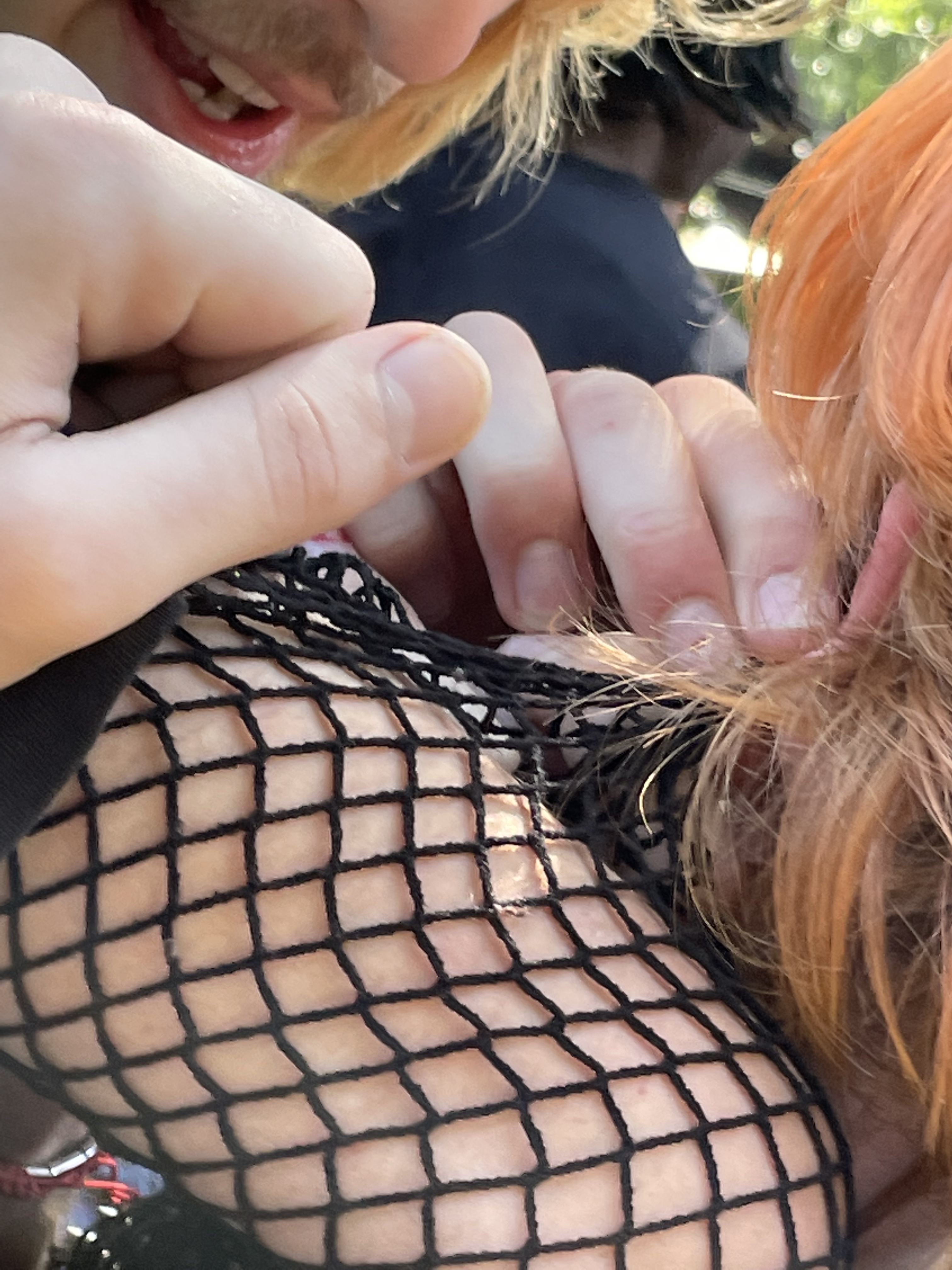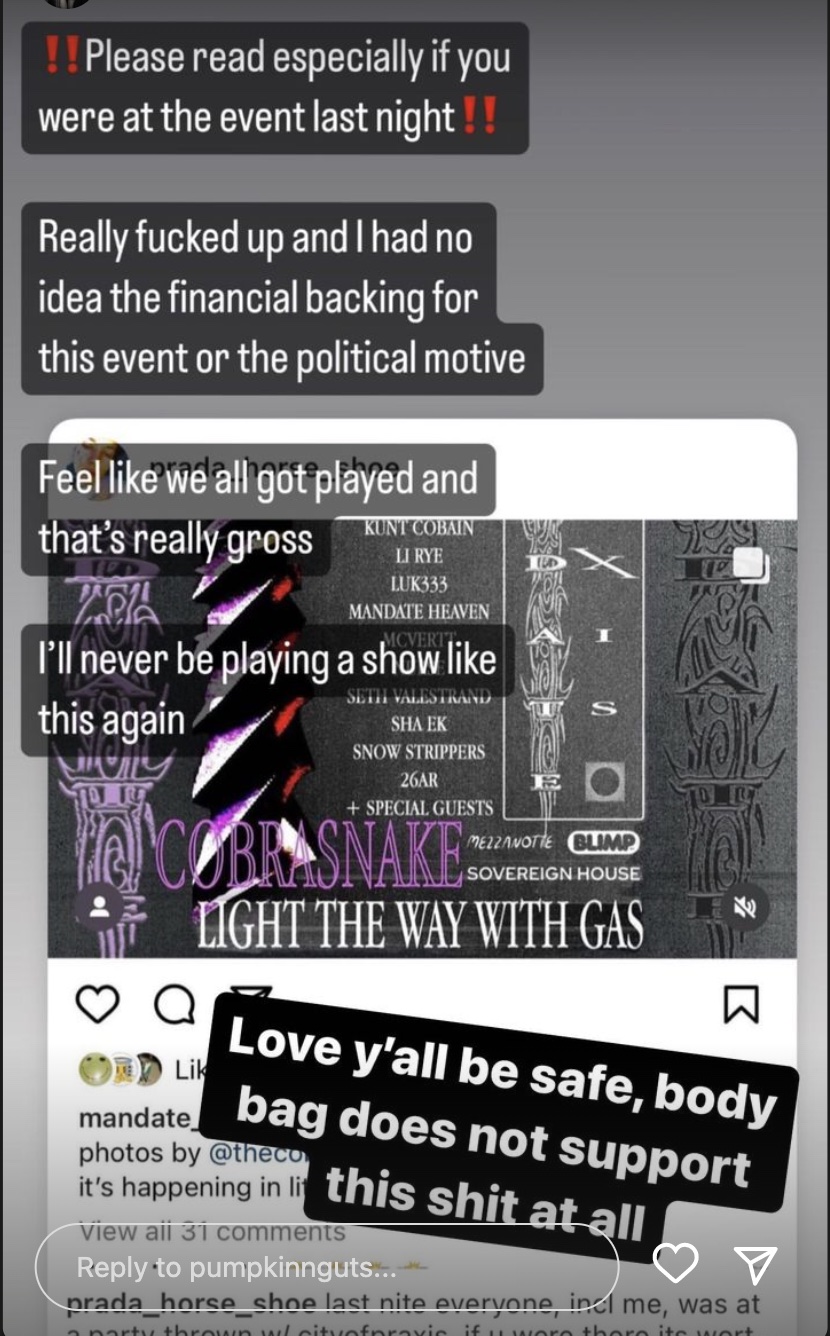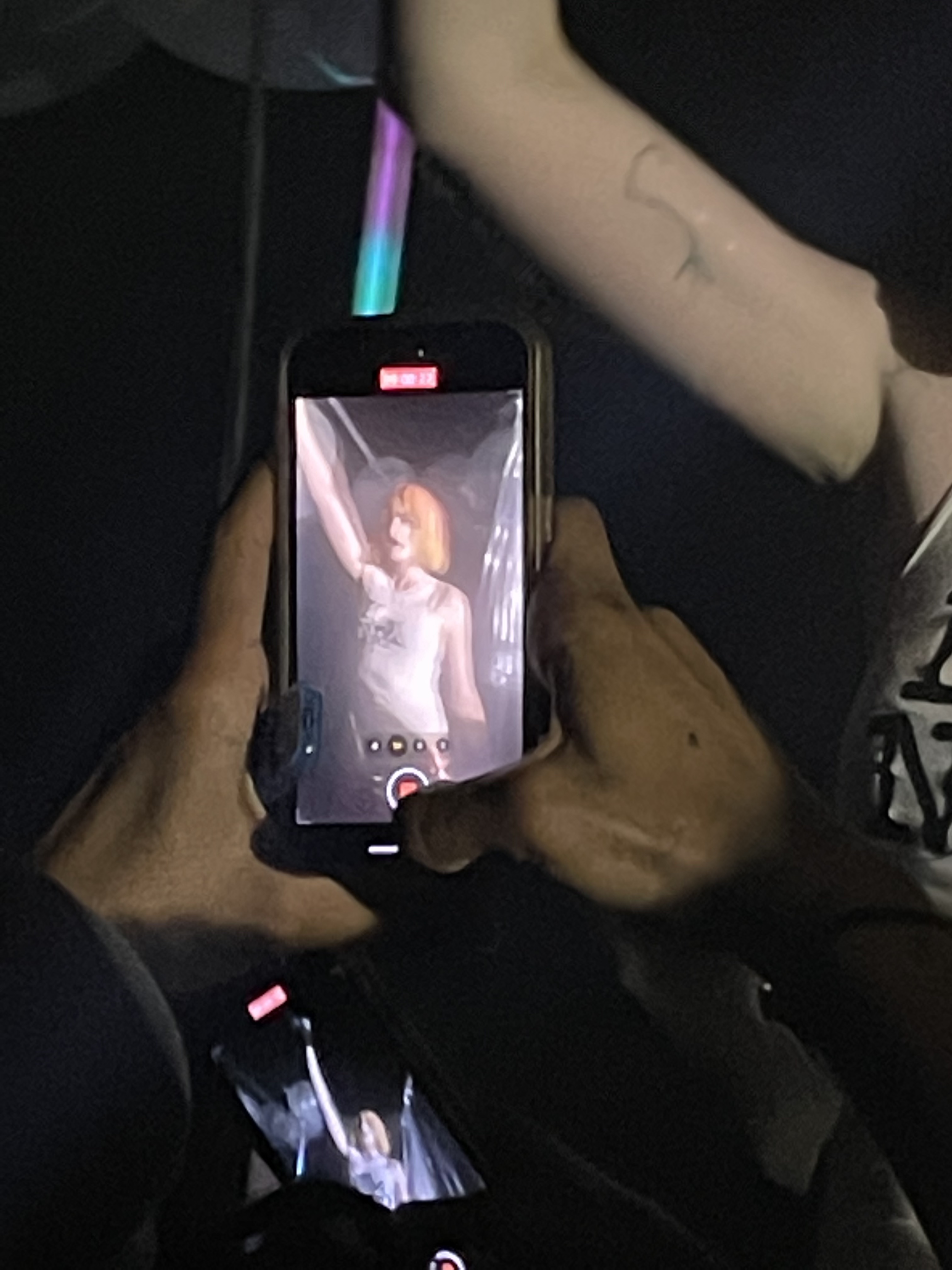on clout laundering, or how close do we have to be to hurt each other
12 June 2023

sun beaming down on uneven concrete, bodies unfurling in the summer heat, sweat stuck on my frame. perspiration is a trace of motion and bodies, dancing as an exchange of fluids. i was in Thompkins to see Soul Glo, Persona, Taz, and other hardcore acts. From breakdown to shouts, arms, fists, and legs, haphazard light catches splayed knots of a tangled mess of people. In a moment, I see two people bent over one another, one’s head pressed against the other’s arm. Moving my way out of the pit, I see that one’s earring had gotten caught on the other’s fishnet armbands. There ensues a different dance, a slow movement of unraveling the ways in which they’d become ensnared. Even as strangers, they are locked in a lover’s embrace, head resting on arms, pulling each other closer to unhook the earring.
From collision to connection, embrace to exit, a snapshot of intimacy emerges in this moment. Intimacy requires closeness—the distance of an earring colliding with a fishnet top. It invites entanglements—ways in which we knowingly and unknowingly become part of the lives of others. It demands trust—the stillness of unhooking the earring to not damage one’s ear or another’s top. Closeness, entanglement, and trust produce messes. Taken together, the sweaty mass of bodies falling over one another at thompkins is a mess, beautiful and breathing atop the sun-soaked pavement. Blood and beer dripping to the crowd, broken glass bottles brushed into the storm drain, I wander back to the grass and fall to the ground.
The metallic taste of a bud light seltzer lingers on my palette as I bike from thompkins to storefront gallery. Panels jut out from the triangular gallery, inviting us into “Canal Street Research Association’s New Land Plaza: You Can’t Beat a New York Original”. Exploring the idea of the counterfeit, Canal Street Research Association’s show moves between painting, sculpture, collage, and video to use illicit counterfeit markets on Canal Street as a lens for the criminalization of public space. The crackdown of counterfeit vendors during the Bloomberg administration collides two property orders: intellectual property (luxury brands, for example) and real estate. As Canal Street Research Association notes, “Since the 2008 bust of the Counterfeit Triangle [on Canal Street], New Land Plaza has remained largely vacant. With liability for storing or selling counterfeit goods now falling on property owners, renting building space to bootleg vendors has become a high risk endeavor.”
How close do you have to be to tell that something is fake? When holding a fake prada bag, does its dishonesty seep into your pores? The counterfeit is enmeshed with the dark side of intimacy. Closeness may demand trust, but it does not compel honesty. In buying the fake prada, I embody glamor without playing the game of luxury capitalism. I subsist in an illusion, one that threatens the order of things because no matter how close you get, you can’t tell the difference.
The crackdown on counterfeit markets denies a space for this illusion to materialize. More importantly, it denies a space for the bootleggers and thieves to gather. This mischievous intimacy disappears. It is dispersed into different rooms and alleyways, the collective project lost. There are many mischievous intimacies scampering around today: the clown, the magician, the scammer, the bootlegger, the launderer, the witch, the ghost, etc etc etc.
Anthropologist Peter Geschiere finds within witches interlocking problems of intimacy, trust, and betrayal. Witches are from within a community and use the trust emergent within intimate connections to get close enough to cast malicious spells. As Geschiere writes, “witchcraft constitutes a secret opening through which the community’s life force is drained” (64). The witch is a cautionary tale of intimacy. Its narrative function is to warn against romanticizing intimacy as a space free of danger and harm. The closeness required to be intimate with someone is the same distance required to hurt someone. Intimacy asks for trust. We are invited to suspend our apprehension of being hurt and to have faith in the other’s good nature.
The witch is a threat from inside of communities. The launderer is a threat to communities through faking their place within a community in order to extract something from it. Unlike the bootlegger targeting luxury brands to eke out a living, the clout launderer identifies communities embodying a particular intimacy and coolness as a site to smuggle harmful ideas, aesthetics, and people through.

As the rave scene gains more prominence, I have noticed the clout launderer slithering their way into the scene over the last two summers. Often times, these are tech or crypto bros who realize they can buy their way into the scene. They hide their interest in reactionary politics (read: hatred of racial minorities, women, queers, and the impoverished) within techno-utopian rhetoric that resonates with elements of the rave scene. But these losers aren’t interested in the rave as a space for people to become themselves, to be lost in the ecstatic play of sound and movement wherein sweaty bodies give way to new ways of understanding. These fuckers just want to pray on vulnerable people and pretend to be cool. They extract whatever social, cultural, and aesthetic capital exists within the rave scene to distract from the reality that they are boring business men, no different from the others obsessed with profit through exploitation.
They launder their clout through their proximinity to the arts. They vampirically prey on intimacy. And they aren’t even hot like actual vampires.
I understand the allure of the clout launderer. They offer money and a party for djs and artists to perform at. I’m not interested in the tired play of cancelling artists who take these oppretunities. Instead, we must develop a collective politics to identify, shame, and expel the clout launderers from our community. These are people who will bring harmful individuals to raves, who will put people in danger, who might like the music but who disdain the culture. Like witches, the difficulty is that these clout launderers lurk among us, hiding within our community. When one’s friends and collaborators are seduced by a clout launderer, they become a witch. They cast spells to attract their friends and fans to the clout launderer’s events, extracting whatever credibility they can from the community they have built.
It is easy to lose oneself in the desire for success and recognition. The clout launderer offers an easy path towards these things. But, it is a short infusion of cash, a momentary flash of a party funded by soulless venture capitalists. The alternative path, one where everyone can find success and recognition, lies in building spaces for alternative worlds to bloom. If we build strong enough communities and systems for supporting each other, the clout launderer has no power.

I’m somewhere lost in a sea of heaving bodies as club eat plays in a lower east side club’s basement. I’m somewhere between the locked embrace of the men in front of me and the locked eye contact of club eat’s frontwoman. I’m somewhere between the intimacy of an entangled earring and the estrangement of watching the show unfold on someone’s phone.
Somewhere in between. Pushing past bodies to get to the dance floor. Shielding myself from unwanted touches. Not exactly finding that same release I did on the Thompkins pavement, but also attracted to a different extension of my body. The bruises still fresh on my flesh, i dance into the night.
I close my eyes and dance alone. Surrounded by friends, there’s a peacefulness in letting the grimy club fade away. This is why the witches and the clout launders represent such a threat. They are the moment when this peacefulness is interrupted by touch or speech. In the unpleasant encounter with these losers, I stop being able to be outside myself and am thrust back into the mundane world.
The desire for intimacy is a repetitive refrain. The politics of intimacy-the construction of a space to find others and yourself—is the chorus of a song I want stuck in my head.